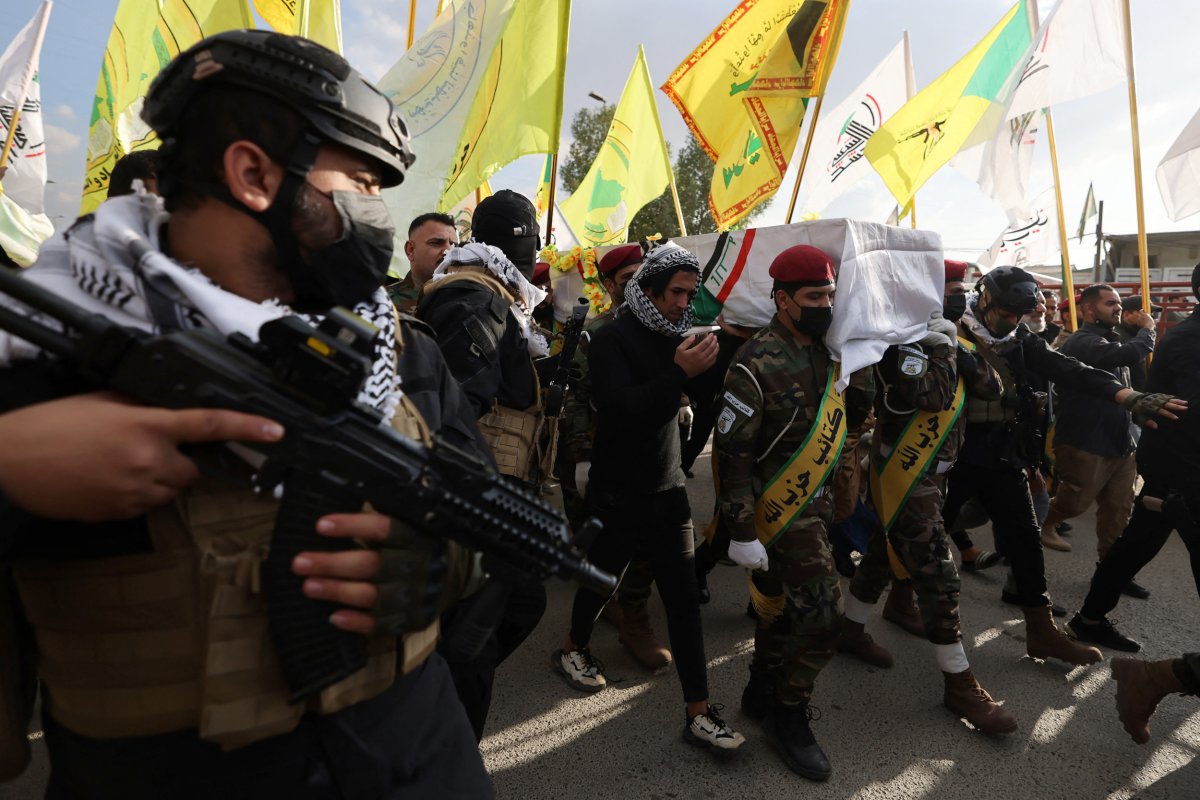A representative of one of the most powerful Iran-aligned militias engaged in attacks against U.S. troops in the Middle East warned President Joe Biden that the group was prepared to strike back should he seek to avenge the deaths of three U.S. soldiers in a recent drone strike at the border between Jordan and Syria.
The White House has yet to divulge how it plans to hit back at the attack that took place Sunday, marking the first U.S. fatalities in a months-long campaign launched by a coalition of militias known as the "Islamic Resistance in Iraq" against U.S. military personnel in response to the ongoing war between Israel and the Palestinian Hamas movement in Gaza.
In comments shared with Newsweek via a Kataib Hezbollah-linked Telegram channel, a representative of the Iraqi group, whose named translates to the "Party of God Brigades," warned that it, too, was drawing up contingency plans just days after announcing it was temporarily suspending attacks against U.S. forces.
"Kataib Hezbollah may be preparing for a possible escalation by the demented Biden, but the potential response remains not precisely defined," the Kataib Hezbollah representative said, "as it may include a strategic assessment and various response options, including targeting American interests or taking additional military measures."
"Kataib Hezbollah confirms that it is prepared to respond at any time and any place," the representative added. "It has undeclared long-range weapons, and we can strike any base in the Middle East."

The representative confirmed that Kataib Hezbollah was a part of the Islamic Resistance in Iraq, alongside the Nujaba Movement and a number of other mostly Shiite Muslim armed paramilitary forces that seek to expel U.S. troops from the region, especially Iraq, by force.
Newsweek has reached out to U.S. Central Command and the White House for comment.
The remarks come at a particularly volatile time for Iraq and the broader region. Heightened unrest has erupted across multiple fronts in the Middle East after Hamas led an unprecedented surprise attack against Israel on October 7 and the Israel Defense Forces (IDF) launched its largest-ever campaign against Gaza.
A number of powerful groups aligned with Iran's "Axis of Resistance," including Lebanon's Hezbollah and Yemen's Ansar Allah, also known as the Houthis, have entered the war against Israel by firing rockets, missiles and drones. But only the units affiliated with the Islamic Resistance in Iraq have thus far waged a concerted campaign against U.S. troops.
The U.S. has responded by conducting a number of strikes against militias in Iraq and Syria, most recently targeting "three facilities used by the Iranian-backed Kataib Hezbollah militia group and other Iran-affiliated groups" south of Baghdad at Jurf al-Sakhar and at the Al-Qaim border Iraq-Syria border crossing as part of an operation announced last Tuesday by Defense Secretary Lloyd Austin.
The strikes played out amid growing questions about the future of U.S. military presence in Iraq. Two days later, on Thursday, Austin announced that U.S. and Iraqi officials would be holding a series of meetings to discuss "the transition to an enduring bilateral security partnership" between the two nations.
Iraqi Prime Minister Mohammed Shia al-Sudani had earlier called for the two sides to reach a "quick" agreement that would see the exit of U.S. troops and other members of an international coalition formed nine years ago to battle the Islamic State militant group (ISIS).
Kataib Hezbollah also played a frontline role in the fight against ISIS, becoming a key member of the Popular Mobilization Forces paramilitary umbrella alongside a number of other Iran-aligned forces. Having been established in the immediate aftermath of the U.S.-led invasion of Iraq that toppled longtime President Saddam Hussein in 2003, the group has garnered battlefield experience against U.S. troops and rival Sunni Muslim insurgents, the most powerful of which went on to form ISIS roughly a decade later.
The war against ISIS briefly united a number of factions in Iraq, including the U.S.-led coalition and Iran-backed paramilitary groups. But the defeat of the jihadis, in parallel with worsening tensions between Washington and Tehran, led to clashes between U.S. forces and Iraqi militias that mounted throughout 2019, culminating in the U.S. killing of Iran's Islamic Revolutionary Guard Corps Quds Force commander Major General Qassem Soleimani at Baghdad International Airport in January 2020.
Killed alongside Soleimani was Popular Mobilization Forces deputy commander Abu Mahdi al-Muhandis, who also served as secretary-general of Kataib Hezbollah. The deaths of the two men have continued to stir outrage among their supporters in Iraq, and the eruption of conflict in Gaza has proved a new catalyst for violence.
Meanwhile, officials in Baghdad have condemned local militias and the U.S. for conducting operations against one another without permission from the central government.
Iran, for its part, has repeatedly denied having command and control over "Axis of Resistance" militias across the region, but the Biden administration has increasingly hardened its rhetoric against the Islamic Republic in response to the repeated attacks. Such attacks have continued even after the drone attack on Sunday, with the Islamic Resistance in Iraq claiming new drone strikes against U.S. forces in the northern Iraqi city of Erbil and against unspecified IDF positions in Israel on Monday.
The following day, Kataib Hezbollah Secretary-General Abu Hussein al-Hamidawi issued a statement announcing "the suspension of military and security operations against the occupation forces—in order to prevent the embarrassment of the Iraqi government."
Hamidawi asserted, however, that "we will continue to defend our people in Gaza in other ways, and we advise the brave, loyal and free mujahideen of Kataib Hezbollah to assume a passive defense [temporarily]."
Replying to this message during a press conference on Tuesday, Pentagon Press Secretary Air Force Major General Pat Ryder said that "actions speak louder than words." He did not directly respond to questions as to whether the U.S. believed Kataib Hezbollah was directly responsible for the strike at the Jordan-Syria border but asserted that "we are confident that this attack was sponsored by Iranian-backed proxies."
The same day, Biden told reporters that he had decided on his response to the drone attack, though he did not disclose what it may entail. He did, however, say he held Iran "responsible in the sense that it supplies weapons to those who carried out the attack."
At the same time, Biden emphasized that he did not "think we need a bigger war in the Middle East."
"That's not what I'm looking for," he said.
Uncommon Knowledge
Newsweek is committed to challenging conventional wisdom and finding connections in the search for common ground.
Newsweek is committed to challenging conventional wisdom and finding connections in the search for common ground.
fairness meter
To Rate This Article
About the writer
Based in his hometown of Staten Island, New York City, Tom O'Connor is an award-winning Senior Writer of Foreign Policy ... Read more
To read how Newsweek uses AI as a newsroom tool, Click here.








